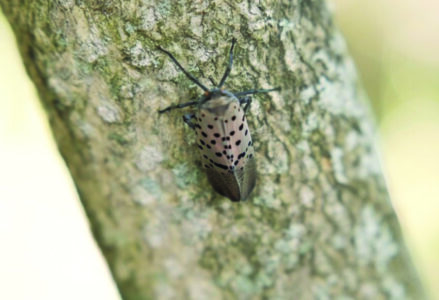Fishing expedition includes burst of color

JOHN PEPIN
“In the wintertime, when all the leaves are brown and the wind blows so chill.” — Steve Miller
On several occasions over the past few weeks I have been treated to whimsical displays of leaves bursting into the air, often with the help of a convincing wind gust.
The leaves fall to the earth like a shower of little, cut-out paper-doll angels, drifting down to the ground.
These scenes have mesmerized me.
The first display I saw was a few weeks ago. I was sitting in a boat, fishing on a clear and cold lake. It was the last 70-degree day of the year.
The winds had been shifting a lot, blowing the boat my buddy and I were fishing from back and forth across the water throughout the afternoon.
The sun felt good on my face. I could feel it soaking into my skin through my sleeves. There were even a few bugs still in the air, and a few fish were biting.
One of the short bursts of wind turned swiftly around a stand of swaying hardwoods and up through the understory, punching free a whole bunch of leaves into the big, blue sky.
The wind is a sly trickster, this is well-established.
It was as though some fanciful clown — maybe the ghost of Rip Taylor — shot red, yellow and orange confetti out of a cannon. The leaves exploded and then danced on the wind briefly before gently sifting down to the shimmering blue water.
A few days later, I watched a show of falling, golden birch leaves from my bedroom window. These leaves didn’t erupt from the branches as quickly, but rather, they fell in a delayed display where several would roll off the branches, tumble, twist and twirl in the air, then more, then still more.
I could almost hear Roger Williams’ piano.
The falling leaves drift by my window. The falling leaves of red and gold.
Earlier this week, I was driving up a hill when at that moment the trees alongside the highway were hit with a powerful wind gust. Brown and withered leaves rained down toward my Jeep.
I wish I would have captured all these scenes on video.
They would have been beautiful to watch in slow motion – like the slow dancing of fireflies or autumn blackbirds all bunched up, blowing in black clouds over the yellowed farm fields.
This week, I was driving north into the high country. Each mile I climbed, the snow clinging to the branches of the trees got thicker. On this day, the wind was harsh, raw and ready to peel back some skin.
There was about a foot of snow on the side roads. The dominant figures across this landscape painted white were those tree trunks that stood alongside the main road.
Feeling a chill in the air would cause them to shiver. Their branches would shake short of a sneeze, loosening and dropping down oak leaves – colored in dark tan and burnt goldenrod.
Approaching from a distance, I first thought a good number of these leaves in the road were small birds, like the numerous handfuls of snow buntings, arrived from the Arctic, that had been fluttering up as one from the gravel in short bursts of flight.
In one place, one lone oak leaf stood straight up on its pointed edges seemingly defying me to run it over, like Joe Ely’s crayfish on a railroad track.
He was brave alright, brave as any man, but his judgment wasn’t worth a damn.
I was also privileged to witness another type of natural display this week.
I sat on a rock at the edge of a cold lake. Some small bushes hid me and obscured the view of a couple of rafts of ducks out on the water. They were hooded and red-breasted mergansers.
The hooded variety was farther offshore, but the red-breasted, numbering about 20, were floating around with a pack of gulls. Or so I thought. In fact, it was the other way around – the gulls were following the mergansers, which were diving for fish.
I saw both groups of birds offshore together, but when I picked my binoculars up off my chest for a better look, I couldn’t believe what I saw. Every single merganser had disappeared beneath the water, leaving only the gulls.
A moment or two later, the mergansers all popped back up again. This was one of the coolest things I have seen in a long time.
The mergansers continued to swim right toward where I sat on my boulder behind the bushes at the end of a short peninsula. They were moving fish into the shallows. One of the ducks flipped a fish up out of the water, tossing it back in its bill.
All the gulls began screeching and crying, flying in to land around this one duck. Some of the other mergansers dove to get fish of their own.
The gulls were left spinning in circles on the surface of the water, with nothing in their bills. They protested with short grunts or other sounds that seemed to broadcast their displeasure.
Off another road, I walked alone with the wind where the woods were silent, and all the animals seemed to be gone. The rocks were cold, black and ancient.
This was a place where the tamaracks were still sporting their yellow fall coats, but they were beginning to look ragged.
The river was still flowing through here like it wasn’t late enough for it to freeze, or maybe it was trying to run faster than the freezing temperatures. It was a welcomed sight to see either way, always something fascinating and inviting about moving water.
In varying shades, the trees trunks and branches changed color as I looked from the earth to the sky at the distant horizon, from gray alder and red dogwood trunks to the dark green and then bright green of cedars, hemlocks and pines.
This was a stark landscape, seemingly freshly sprung from the glacial ice. And I, all alone, might have been the first human walking across this place – maybe following the tracks of a caribou.
I saw the tiny, bleached bones of some poor creature balled up in the fur of a coyote scat. The surface of the pond was frozen and covered with fresh snowflakes.
I recalled a plastic bag from the movie “American Beauty,” blowing around on the wind, in and out of corners, up and down the street. In that moment, I could see myself being like that plastic bag, or a pointed oak leaf swaying on a branch.
And soon I’ll hear old winter’s song, but I miss you most of all my darling when autumn leaves start to fall.
Editor’s note: John Pepin is the deputy public information officer for the Michigan Department of Natural Resources. Outdoors North is a weekly column produced by the Michigan Department of Natural Resources on a wide range of topics important to those who enjoy and appreciate Michigan’s world-class natural resources of the Upper Peninsula. Send correspondence to pepinj@michigan.gov or 1990 U.S. 41 South, Marquette, MI 49855.




